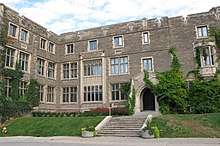This article needs additional citations for verification. (September 2018) |
 Hamilton Hall is the home to many classes and offices of the Department of Mathematics and Statistics in the Faculty of Science | |
| Established | 1962 |
|---|---|
| Affiliation | McMaster University |
| Dean | Dr. Maureen MacDonald |
| Students | 7,400 |
| Location | , , |
| Website | Faculty of Science |
The Faculty of Science is the largest of six faculties at McMaster University in Hamilton, Ontario, Canada. Founded in 1962, the faculty is located in the Westdale neighbourhood.[1] It houses 6,800 undergraduate students and 600 graduate students, across 39 upper-year undergraduate programs ranging from astrophysics, biochemistry, earth and environmental sciences, to life sciences, human behaviour, kinesiology and medical and radiation sciences.[1] Notable discoveries at McMaster University include the development of neutron spectroscopy by Bertram Brockhouse which earned him a Nobel Prize in Physics in 1994.[2]
Under the presidency of Dr. H.G. Thode in the 1960s, scientific research at McMaster was intensive and yielded important discoveries in the areas of science and engineering. In 1959, McMaster's Nuclear Reactor was built for the purpose of nuclear and medical radiation research. McMaster is the only Canadian university that contains a nuclear reactor in their campus. Scientific research at McMaster University earned the university high rankings in the areas of research and strength in science, where it is ranked seventh in Canada and 212th in the world according to QS University Rankings 2017 for Natural Sciences.[3]
- ^ a b McMaster University. "Faculty of Science". www.science.mcmaster.ca. Retrieved 2020-11-24.
- ^ The Nobel Foundation. "The Nobel Prize in Physics 1994". NobelPrize.org. Retrieved 2020-11-24.
- ^ QS Quacquarelli Symonds Limited (2020-02-26). "Natural Science". Top Universities. Retrieved 2020-11-24.